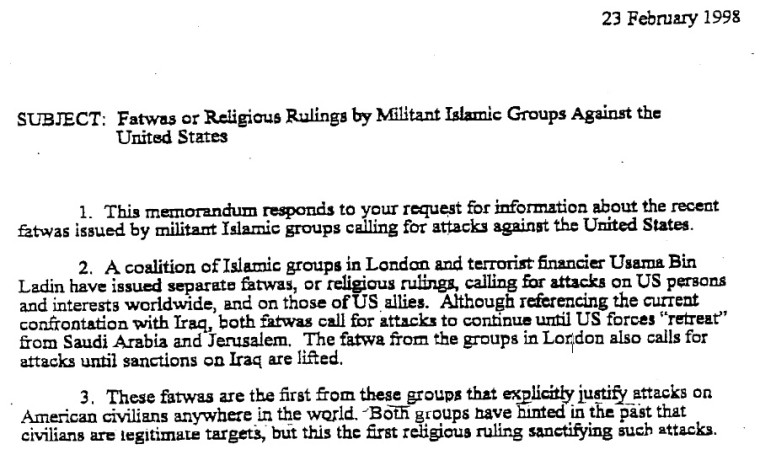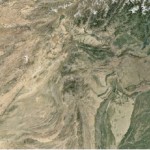ON STOVEPIPING: EARLY FATWAS SHOWED AL-QA’IDA DECLARED WAR ON US YEARS BEFORE BIN LADEN DID SO PUBLICLY
ON STOVEPIPING: EARLY FATWAS SHOWED AL-QA’IDA DECLARED WAR ON US YEARS BEFORE BIN LADEN DID SO PUBLICLY
By Ronald Sandee
On 23 February 1998, the day that Usama bin Laden again publicly declared war on the United States with the release of a fatwa urging jihad against “Jews and Crusaders,” CIA circulated a memorandum which conveyed the assessment that both bin Laden’s most recent fatwa and the fatwa issued by a coalition of Islamic groups in London were “the first from these groups that explicitly justify attacks on American civilians anywhere in the world.” The document explained that “Both groups have hinted in the past that civilians are legitimate targets, but this [is] the first religious ruling satisfying such attacks.”
Usama bin Laden’s 1998 fatwa explicitly stated: “The ruling to kill the Americans and their allies — civilians and military — is an individual duty for every Muslim who can do it in any country in which it is possible to do it, in order to liberate the al-Aqsa Mosque and the holy mosque [Mecca] from their grip, and in order for their armies to move out of all the lands of Islam, defeated and unable to threaten any Muslim.”
It is true that the 1998 fatwa was the culmination of a series of fatwas issued since 1992 from Sudan by the Shura of the Islamic Army (al-Qa’ida). Meanwhile, according to the transcript of interviews the FBI conducted with al-Qa’ida member Jamal al-Fadl in 1996, the Shura responsible for devolving fatwas to the Islamic Army — ostensibly in deference to bin Laden’s concerns — had issued a fatwa that called for attacks on Americans years earlier, with justification for killing civilians during such operations apparently also provided by Shura members well before 1998.
According to al-Fadl, the initial fatwa against the US was issued around the time bin Laden arrived in Sudan, and was distributed internally in a pamphlet. This fatwa was aimed against Americans in Saudi Arabia and in the Arabian Peninsula as a whole.
Shura member Abu Hajer al-Iraqi, who delivered lectures about the presence of US troops in Saudi Arabia, was responsible for explaining the fatwa to al-Qa’ida members. It was discussed in an Islamic jurisprudence context, and Abu Hajer’s conclusion was that the Americans had no legitimate right to be in Saudi Arabia. Usama bin Ladin attended a lecture, and answered some questions at its conclusion.
A second fatwa was issued against President George Herbert Walker Bush. The fatwa was issued because it was believed that President Bush was responsible for the situation in Saudi Arabia and the greater Arabian Peninsula, but especially the American military presence in Saudi Arabia. This fatwa was also issued after the Gulf War.
The third fatwa was issued around the time of Operation Restore Hope in Somalia (ie late in ’92, or early in ’93). This fatwa called for the expulsion of US forces from the Horn of Africa. Again, the fatwa was printed and distributed as a pamphlet.
Bin Laden saw the participation of US troops in Operation Restore Hope as an existential threat for the Islamic Army in Sudan. Bin Laden believed that the American troops would use Somalia as a hub for further operations into Sudan. He had predicted that the Americans would not leave Saudi Arabia, and the fact that the Americans stayed in Saudi Arabia was said to be proof that they would never leave Somalia once entrenched. So bin Laden asserted it would be easier to expel the Americans from Somalia, and this should be done immediately.
Abu Hafs al-Masri was sure that Operation Restore Hope was a direct response to his recent presence in Somalia.
The point man who gave lectures about this fatwa was Abu Talha al-Sudani.
The fourth fatwa was probably issued in early 1993 (al-Fadl advised it was possibly issued in the summer of 1992), and was focused only on American forces in Saudi Arabia. Pamphlets that contained this fatwa were distributed by Wa’el Julaidan (aka Abu al-Hasan al-Madani), who was part of the information office.
There were many lectures, and much discussion was had about this fatwa. Leaders of the Islamic Army gave talks about the fatwa. Meanwhile, Abu Hafs al-Masri and Abu Ibrahim al-Iraqi focused their talks on the justification for this fatwa contained in the Koran.
According to al-Fadl, there was discussion about attacking a US embassy or American club. There was also a general discussion about the legality of attacking the Embassy or club as innocent people, even Muslims, could be killed. It was explained that the fact that a Muslim would work with the Americans shows that the Muslim is a collaborator. Therefore, it would be acceptable if the Muslim should die during such an operation.
Some of the jihadis expressed concerns that a fatwa against the Americans would bring too much trouble.
In late 1995, a fifth fatwa was issued. This one was against American military personnel and US government employees.
Next, in August 1996, Bin Laden declared war by releasing another fatwa. In it, bin Laden advised the Ummah: “Your brothers in Palestine and in the land of the two Holy Places are calling upon your help and asking you to take part in fighting against the enemy — your enemy and their enemy — the Americans and the Israelis. They are asking you to do whatever you can, with one’s own means and ability, to expel the enemy, humiliated and defeated, out of the sanctities of Islam.” One thing that stood out about this fatwa was its publication in al-Islah, the magazine of the Movement for Islamic Reform in Arabia in London.




